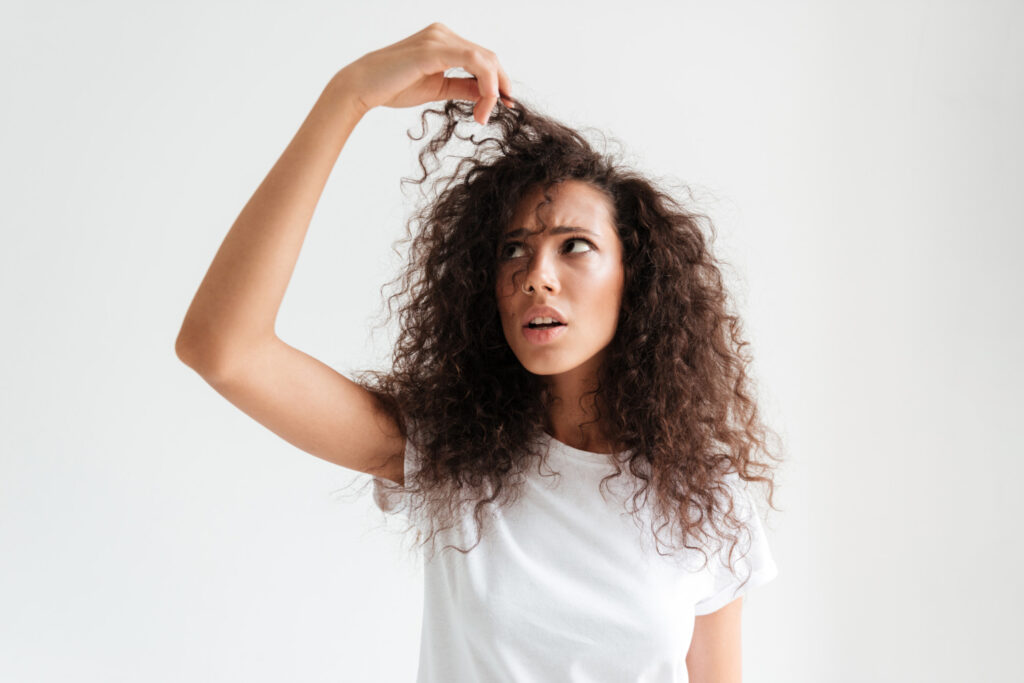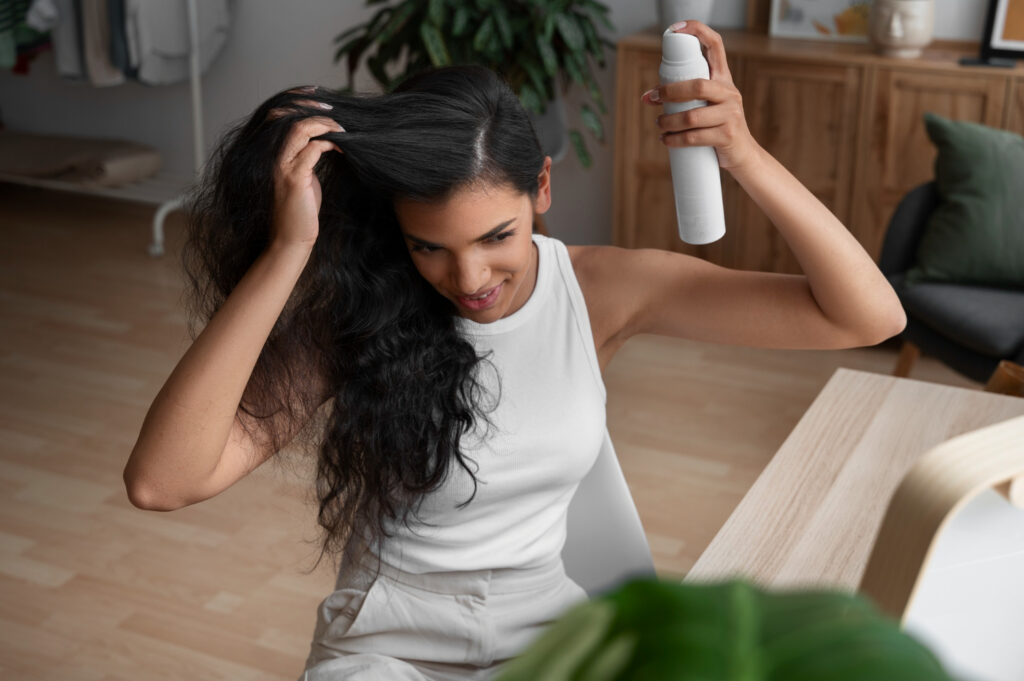
In this article
Hair growth and quality are influenced by genetics, but your lifestyle choices and hair care routine can also make a significant difference. While you might not see drastic length changes in just a week, enhancing your hair’s health can create the appearance of faster growth. A holistic approach using DIY hair masks, scalp massages, vitamins, herbal treatments, and serums can promote healthier, stronger hair. Here’s how you can work towards growing your hair faster naturally in a week.
Top Products for Hair Growth
- Best Supplement: Biotin + Keranat by Stronger Me Healthy Hair
- These melting strips provide a quick and efficient way to increase your biotin intake, essential for hair health.
- Best Oil: Nat Habit Cold Pressed Castor Oil
- Rich in fatty acids and nutrients, this oil strengthens hair, nourishes the scalp, reduces dandruff, and improves hair texture.
- Best Serum: L’Oreal Paris Serum for Dry, Flyaway & Frizzy Hair
- Instantly smooths and adds shine to frizzy hair, making it more manageable and sleek.
- Best Shampoo: Tresemme Keratin Smooth Shampoo
- Infused with keratin and marula oil, it reduces frizz, detangles hair, and leaves it smooth and shiny.
Achievable Expectations in a Week
While it’s unrealistic to expect significant length changes in a week, you can improve your hair’s overall health, making it look and feel better. Hair grows approximately 0.125 inches per week during the anagen phase. Though this growth is minor, healthier hair is less prone to breakage, giving the impression of faster growth.
Tips to Promote Faster Hair Growth

Proper Hair Care
- Scalp Massages: Use oils like castor, coconut, or jojoba to massage your scalp, improving blood flow and nourishing hair follicles.
- Hydration: Drink plenty of water to keep your scalp and hair hydrated, preventing dryness and brittleness.
- Vitamin Intake: Ensure you get enough vitamin D from the sun or supplements, crucial for hair follicle cycling.
- Iron-Rich Foods: Consume iron-rich foods like red meat, lentils, and spinach to prevent iron deficiency-related hair loss.
- Zinc Supplements: Maintain healthy hair tissue growth and oil glands with zinc supplements.
- Vitamin E: Take vitamin E oil or tablets to support a healthier scalp and hair growth.
- Herbal Rinses: Use herbal infusions like rosemary or green tea to rinse your hair, promoting growth and shine.
- Minimize Heat Styling: Avoid excessive use of heat styling tools to prevent damage and breakage.
- Regular Trims: Trim your hair every 6-8 weeks to remove split ends and encourage healthy growth.
- Gentle Hair Care: Use a mild shampoo, avoid overwashing, and rinse with cold water to add shine and seal cuticles.
Healthy Lifestyle Habits
- Balanced Diet: Eat a diet rich in vitamins and minerals, including vitamins A, C, D, and E, iron, and zinc.
- Protein Treatments: Strengthen and repair damaged hair with regular protein treatments.
- Protective Measures: Use silk pillowcases, and protect your hair from harsh weather with scarves or hats.
- Stress Management: Reduce stress through exercise, yoga, or meditation, as stress can negatively impact hair health.
- Adequate Sleep: Ensure you get 7-8 hours of sleep each night for overall health and hair growth.
Understanding Hair Loss
Common Causes
- Genetic Conditions: Androgenetic alopecia, or pattern baldness, can cause hair loss.
- Hormonal Imbalances: Changes due to menopause, pregnancy, childbirth, or thyroid issues can lead to hair thinning.
- Nutrient Deficiencies: Lack of essential nutrients like vitamins, iron, and protein can result in hair loss.
- Stress: Physical or psychological stress can trigger temporary hair loss, known as telogen effluvium.
- Chemical Damage: Frequent use of chemical treatments, dyes, and heat styling can damage hair.
- Traction Alopecia: Tight hairstyles that pull on hair can cause this condition, leading to hair loss.
- Poor Hair Care: Harsh shampoos, frequent washing, and improper hair care can weaken hair.
- Environmental Factors: UV radiation, severe weather, and pollution can damage hair.
- Medical Conditions: Some illnesses or significant weight loss can cause temporary hair loss.
Factors Promoting Hair Growth
- Balanced Diet: A diet rich in vitamins and minerals supports hair health.
- Hydration: Adequate water intake keeps hair hydrated, reducing brittleness.
- Preventing Damage: Minimizing the use of heat styling tools, chemical treatments, and tight hairstyles.
- Essential Oils: Oils like peppermint, lavender, and rosemary can stimulate hair follicles.
- Protein Treatments: Regular treatments can strengthen hair.
- Frequent Trims: Removing split ends can promote healthier hair.
- Sufficient Sleep: Essential for overall health and hair regeneration.
- Stress Management: Reducing stress can improve hair health.
- Herbal Supplements: Supplements like biotin, iron, zinc, and omega-3 fatty acids can promote hair growth.
- Hormonal Balance: Maintaining hormonal balance can support hair growth.
- Avoiding Smoking: Smoking restricts blood flow to hair follicles, hindering growth.
- Scalp Exfoliation: Regular exfoliation can create a healthy environment for hair growth.
- Hair Growth Serums: Applying serums with ingredients like caffeine or niacinamide can stimulate hair follicles.
Hair Growth Stages
- Anagen Phase: The active growth phase lasting 2-7 years, where hair grows about half an inch per month.
- Catagen Phase: A brief transitional phase lasting about 2-3 weeks.
- Telogen Phase: The resting phase lasting around 3 months, where new hair pushes out the old hair.
- Exogen Phase: The shedding phase, where old hair falls out, and new hair begins to grow.
- New Anagen Phase: The cycle repeats with new hair growth starting.
When to See a Doctor
- Significant Thinning or Sudden Hair Loss: Seek medical advice if you notice substantial thinning or an increase in hair loss.
- Patchy Hair Loss: Consult a doctor if you observe patchy hair loss, which could indicate alopecia areata.
- Severe Postpartum Hair Loss: While postpartum hair loss is normal, see a doctor if it’s severe or persistent.
- Medication Side Effects: If hair loss is linked to medication, discuss alternatives with your doctor.
- Children’s Hair Loss: Hair loss in children should be examined by a pediatrician or dermatologist.
- Additional Symptoms: If hair loss is accompanied by other symptoms like fatigue or weight changes, seek medical attention.
- Brittle Hair: Consult a doctor if your hair suddenly becomes brittle and breaks easily.
- Family History: If there is a family history of hair loss, it’s advisable to consult a healthcare provider.
By following these tips and understanding the factors affecting hair growth, you can work towards healthier, stronger hair. While significant length changes may not be noticeable in a week, improved hair health can lead to the appearance of faster growth over time
A Quick Review
Improving hair health in a week can create the appearance of faster growth. Key strategies include scalp massages with essential oils, staying hydrated, consuming vital nutrients like vitamins and minerals, using herbal rinses, minimizing heat styling, and regular trims. Although significant length changes are unlikely in a week, these methods can enhance hair’s overall health and appearance
Frequently Asked Questions (FAQs)
Can I really see noticeable hair growth in just one week?
While significant length changes are unlikely in just one week, you can improve the overall health and appearance of your hair. Healthier hair is less prone to breakage and may give the impression of faster growth.
What natural oils are best for promoting hair growth?
Castor oil, coconut oil, and jojoba oil are excellent choices. They nourish the scalp, strengthen hair, and improve blood circulation to the hair follicles.
How often should I massage my scalp to promote hair growth?
For best results, massage your scalp with natural oils for about 5-10 minutes daily. This helps increase blood flow to the hair follicles, providing them with essential nutrients and oxygen.












